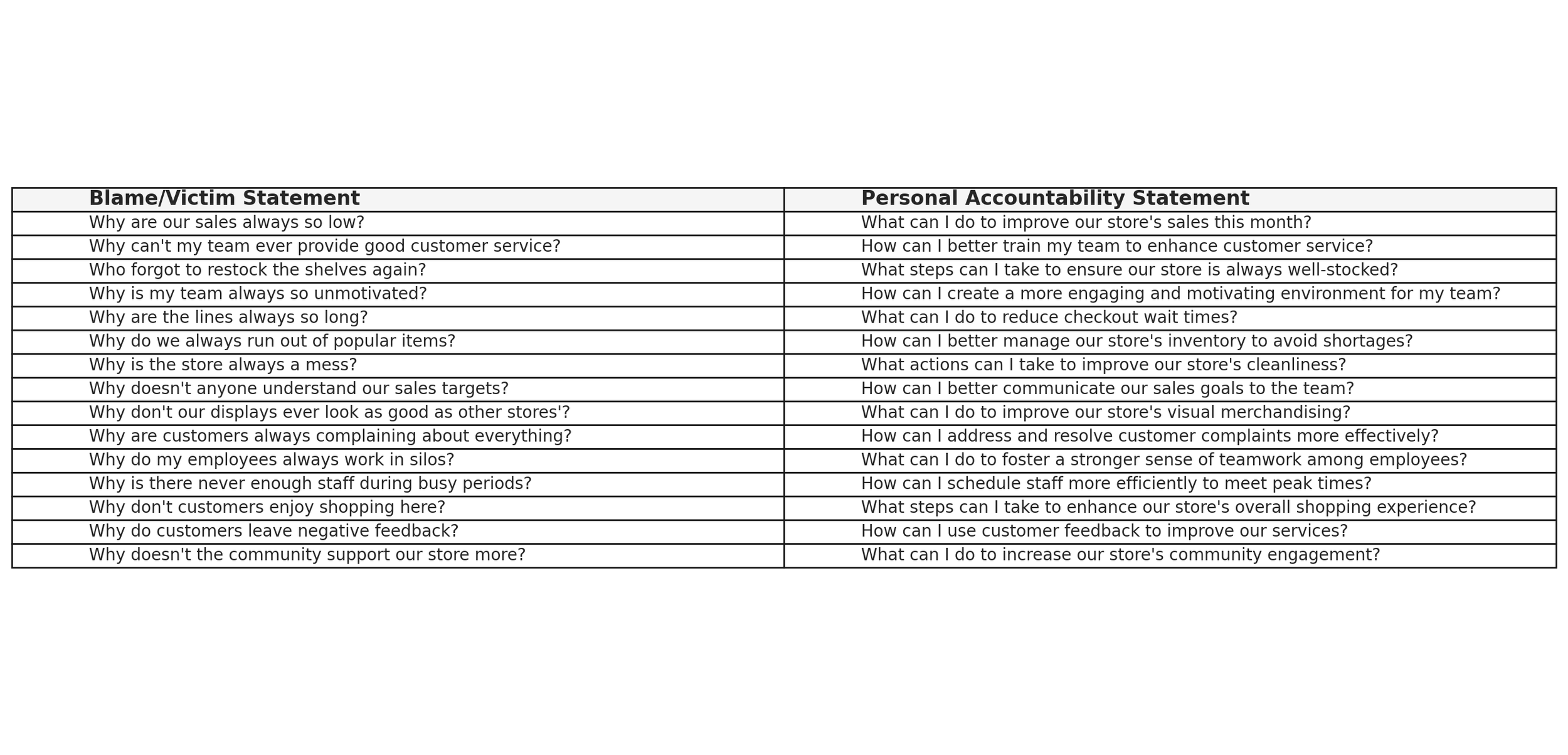Integrating Personal Accountability into Daily Leadership Practices
In our previous discussion, we explored the foundational steps for implementing personal accountability using the principles from The Oz Principle and QBQ!. Now, let’s dive deeper into how you can make these practices an integral part of your daily leadership routine. Personal accountability is not a one-time effort but a continuous process that shapes your interactions, decisions, and overall leadership approach.
By understanding and applying these principles consistently, you can build a culture of accountability that resonates with your team. This article will guide you through creating a personal accountability system that works in your specific environment, helping you turn concepts into actionable steps.
QBQs
Using similar examples as above, here is a chart of questions that may creep into your mind. It also provides an alternative, QBQ or ‘above the line’ approach you could take.
Combining Concepts
Your approach doesn’t have to be one or the other thought process. There are other personal accountability models available, but what we have discussed so far are only two examples (I happen to think they are really useful, so I selected those). But taking how they work together may be the best approach for you. Ask QBQs, then use the Oz Principle framework to work through your next steps.
Using an example from above around hiring, what might you look for as to why the quality of your new employees is not what you would want? Have you observed what the onboarding process looks like? Do team members get the right information they need when they start? How much time do you or your second-level managers spend with them in the first one to five shifts they work? Are they clear on your expectations within your store?
Even before onboarding, what does your recruiting process look like? Where are you sourcing candidates from? Are you just hoping people fill in the online application that you've had posted for weeks or months? Is that simply an evergreen posting that is always out there, and you only look when an opening occurs? When was the last time you saw someone provide great service in another store, and you offered them an opportunity to come speak to you about options? The quality of our teams is fully within our control. Even if your pay rate is lower than others, what other benefits could you offer a candidate? Would schedule flexibility be valuable to them? Would the culture of the store be important to them, and what can you offer versus what they have? We all know it is not always about money. And, even if rate becomes an issue, what discussions have you had? What data can you provide to show that you are offering wages that are well below the market offering? There is so much more you can do when you embrace QBQs to begin your See It, Own It, Solve It, Do It approach.
100/0
Now that you can see how you could apply the concepts from QBQ and the Oz Principle, allow me to share one other mindset that I believe goes along with both of these. When you are already in a frame of mind about taking personal ownership, this makes perfect sense. Below is a video that illustrates the power of 100/0 thinking. It is simply, 100% responsibility, 0% excuses. 100% of the time, you take responsibility for your actions. It is not about someone else—you never say, ‘it's not my job’, you own your actions. The 0% excuses is all about not compromising your performance. Zero excuses for not performing at the expected level with every customer or interaction, every day. It is a powerful, yet simple message.
100% Responsibility 0% Excuses from Simple Truths
I love the video above and think it, too, is a great message to think about, and share with others. Sharing personal accountability concepts and practices requires careful consideration. It's essential to ensure that your understanding of personal accountability is well-defined and that your actions consistently reflect these principles. As I will cover in the final article, embodying personal accountability behaviors is crucial for fostering a positive impact rather than eroding trust. Without this alignment, attempts to promote accountability may backfire and undermine your credibility as a leader.
There is another video from Simple Truths that covers the concept of 100/0 as well, which is worth a watch. It reinforces the idea in a simple to watch set of quotes and comments.
More on the 100% Responsibility 0% Excuses concept from Simple Truths
As you implement these accountability practices, keep in mind that consistency and self-awareness are key. Regularly evaluate your progress and be honest with yourself about areas for improvement. In the final article, we will discuss common obstacles you may face when adopting a personal accountability mindset and provide strategies to overcome them. Embracing accountability is a journey, and with the right tools and mindset, you can lead your team to new heights of success. Stay committed, stay accountable, and watch your leadership flourish. In the final article, I’ll share more practical tips on overcoming obstacles and driving lasting change within your team and yourself.
What can you do to create a 100/0 mindset for yourself?
Join other retail leaders in continuing their development journey with Effective Retail Leader.com. SUBSCRIBE today to receive leadership tips directly to your inbox and monthly newsletters that provide many tools to help further develop your leadership skills. JOIN NOW!
Photo by Patrick Robert Doyle on Unsplash



